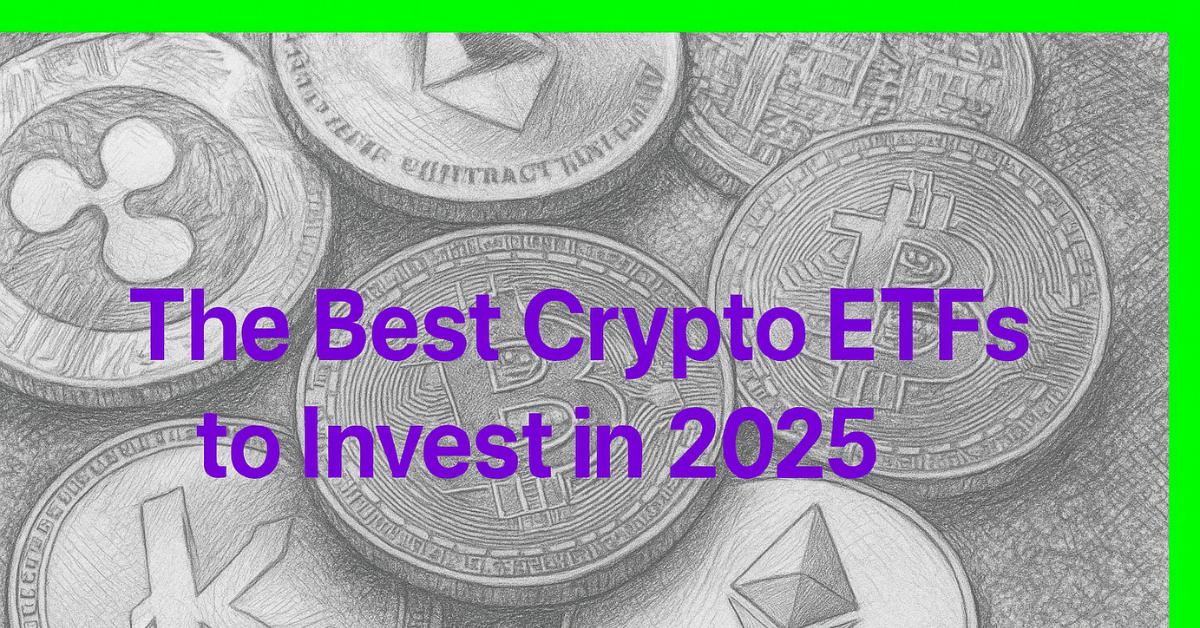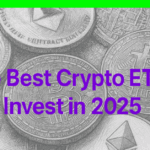The 2025 Crypto ETF Landscape

Your Ultimate Crypto ETFs Guide to Spot and Futures ETFs
Cryptocurrencies have evolved from niche assets to institutional investment tools, and 2025 is poised to be a pivotal year. As demand grows, Exchange-Traded Funds (ETFs) have become a popular vehicle for exposure to digital assets. Whether you’re a retail investor or an institution, understanding the “crypto ETF” landscape can give you a significant edge.
As cryptocurrencies move into the mainstream adoption phase, if market conditions and sentiment hold, many approvals are in the cards for spot ETFs by the U.S. Securities and Exchange Commission (SEC). Institutional adoption is picking up, and ETFs create another route to hold crypto assets.
The high volatility of the crypto market is now seen as an advantage rather than a drawback, and small positions have delivered meaningful returns for investors. Following the approval of Bitcoin and Ethereum ETFs last year, new ETFs are on the way, and they will allow traders to purchase cryptocurrencies such as Solana and XRP through a low-cost fund. These crypto assets will now be more accessible to investors using traditional brokerages.
In this crypto ETF guide, we’ll explore the different types of ETFs, how they function, current players in the market, and what lies ahead in the world of crypto ETF investing. This is your all-in-one crypto ETF guide for navigating 2025.
What Is an ETF? Spot vs. Futures
An ETF (Exchange-Traded Fund) is a type of investment fund that holds assets such as stocks, bonds, or commodities and trades on stock exchanges, much like individual stocks. Crypto ETFs specifically track the price of cryptocurrencies.
There are two main types of crypto ETFs:
Spot Crypto ETFs
Spot ETFs hold actual crypto assets (e.g., BTC, ETH, XRP). This means when you buy shares of a spot ETF, you’re essentially investing in the actual coin that the fund holds in cold storage. This is considered more direct exposure.
Futures Crypto ETFs
Futures ETFs, on the other hand, track futures contracts on cryptocurrencies rather than the crypto itself. Futures are agreements to buy or sell an asset at a predetermined future date and price. These ETFs do not hold the actual coin, and their performance can diverge from the underlying crypto asset.
Comparison Summary:
- Spot ETFs = actual crypto holdings
- Futures ETFs = contracts betting on future prices
How Crypto-ETFs Work
Part of this crypto ETF guide is to help you understand the mechanics of how crypto ETFs operate and can demystify the investment process.
Creation & Redemption
Crypto ETFs work via a creation and redemption process:
- Authorized participants (usually large financial institutions) deliver crypto (for spot ETFs) or cash (for futures ETFs) to the fund in exchange for shares.
- These shares are then traded on the open market.
- Investors buy and sell ETF shares without interacting directly with the underlying crypto.
Custody
Custody is critical in spot ETFs. Funds must store large quantities of crypto securely, typically with institutional custodians like Coinbase Custody, BitGo, or Fidelity Digital Assets. Custodians use cold storage solutions to reduce hacking risk.
Futures ETFs avoid custody complexities because they hold contracts, not the actual asset.
Which Crypto ETFs Can We Expect in 2025?
2025 has already seen a flurry of crypto ETF developments across the globe. The SEC has received 72 crypto ETF filings. With a pro-crypto SEC, there is a high chance that many of these will be approved, especially emerging assets like Solana, Dogecoin, XRP, and others beyond just Bitcoin. Our prediction in this crypto ETF guide is that these could soon become the best Crypto ETFs for 2025.
XRP ETFs
Hashdex and Genial Investimentos have launched the world’s first XRP spot ETF, XRPH11, on B3 (the Brazilian Stock Exchange). It is listed under the Nasdaq XRP Reference Price Index and is targeting advanced investors. XRPH11 will have at least 95% of its assets directly in the Ripple token. The fund offers direct exposure to XRP price movements and reflects growing global interest in altcoin ETFs.
The first US leveraged XRP ETF, Teucrium’s 2x Long Daily XRP ETF, was finally approved last month and launched on NYSE Arca. It is under the ticker XXRP. This XRP ETF will offer investors twice the daily return of the Ripple (XRP) token. Institutional investors have long been waiting for a Ripple ETF, and Teucrium might file to list more crypto ETFs soon.
ProShares will debut three futures-based XRP ETFs on May 14, 2025. These include the Ultra XRP ETF with 2x leverage, the Short XRP ETF, and the Ultra Short XRP ETF with -2x leverage. The market has been waiting for XRP ETF approval for a while, and this marks a significant step for Ripple Labs.
Major players like Franklin Templeton, Bitwise, Grayscale, and Galaxy Digital are lobbying the SEC for a spot XRP ETF, arguing that Ripple’s partial legal victory over the SEC clears the path for regulatory approval. Analysts predict 2025 could be the year a spot XRP ETF gets greenlit in the United States. The SEC extended its decision on Franklin Templeton’s proposal until June 17.
Solana ETFs
Solana ETFs could be approved soon. According to Bloomberg Intelligence, there is a 90% chance that the SEC will approve a Solana ETF in 2025. Six asset managers, including Grayscale, VanEck, and 21Shares, are awaiting clearance from the US Securities and Exchange Commission (SEC) to list SOL ETFs.
Canada has approved four spot Solana ETFs while U.S issuers like Grayscale remain stuck in SEC review. Investors in Canada will gain regulated access to Solana’s high-performance blockchain without needing digital wallets.
DOGE ETFs
Meme king Dogecoin also has a high chance of its ETF approval under the current SEC.
There are four Dogecoin ETF filings awaiting approval: the Bitwise Dogecoin ETF, the Grayscale Dogecoin ETF, the 21Shares Dogecoin ETF, and the Osprey Fund Dogecoin ETF. Grayscale’s ETF application is due for a response on May 21 after the SEC delayed its decision on multiple crypto ETF filings. SEC has postponed its decision on Bitwise’s spot DOGE ETF until June 15. Bitwise’s filing could receive a response on May 18.
Source: Bloomberg Intelligence
Institutional Inflows vs. Retail Demand
The launch of spot Bitcoin ETFs in the U.S. opened the floodgates for institutional investment, with BlackRock’s iShares Bitcoin Trust attracting billions in AUM (assets under management) within months. Once spot XRP and SOL ETFs are approved, institutional and retail investment in this blockchain will grow immensely. Spot Bitcoin ETFs attracted $65 billion of investment in 2024, helping the Bitcoin price surge to new highs. Similar growth can be expected for altcoin ETFs.
Here is why institutional and retail investors both benefit from ETFs:
Institutional Interest
- Risk-adjusted exposure: ETFs offer a regulated and secure way to get exposure to crypto.
- Custodianship and reporting: Makes it easier for pension funds and hedge funds to allocate capital.
- Liquidity and scalability: ETFs provide high liquidity, reducing slippage for large trades.
Retail Demand
Retail investors benefit from:
- Easy access via brokerage accounts
- No need to manage wallets or private keys
- Lower perceived risk compared to direct crypto investing
However, retail remains sensitive to fee structures and fund performance, especially during bear markets.
Risks, Fees, and Tax Implications
Risks
- Volatility: Crypto markets remain extremely volatile.
- Tracking Error: Futures ETFs can deviate from the spot market.
Regulatory Risk: Changes in regulation can affect ETF legality and performance.
Custody Risk: In spot ETFs, hacking or mismanagement of assets by custodians is a concern.
Fees
Crypto ETFs often have higher expense ratios than traditional ETFs.
- Futures ETFs: 0.75% to 1.5%
- Spot ETFs: 0.25% to 1.0%
Always compare fees before investing, especially for long-term holdings.
Taxes
- Futures ETFs may be treated as Section 1256 contracts in the U.S., which could result in favorable 60/40 capital gains tax treatment.
- Spot ETFs are taxed based on standard capital gains.
Consult a tax advisor to understand how these products fit into your financial picture.
What are the Best Crypto ETFs 2025 has to offer?
The answer depends on your investment goals, risk tolerance, and regional access. However, based on early 2025 data, here are some strong contenders for the best Crypto ETFs for 2025:
Top ETFs to Watch:
- iShares Bitcoin Trust (IBIT)
- BlackRock’s ETF
- Strong AUM and liquidity
- Low tracking error
- Hashdex Spot XRP ETF (Brazil)
- Ideal for investors seeking altcoin exposure
- Spot-based
Regulatory clarity in Brazil
- Fidelity Ethereum Fund (FETH)
- Best crypto ETF focused on ETH
- Backed by a strong custodian and low fees
- Purpose Bitcoin ETF (Canada)
- One of the first spot ETFs in the world
- Good for international investors
- Bitwise Crypto Industry Innovators ETF (BITQ)
- Doesn’t hold crypto directly but includes companies in the crypto ecosystem that derive a significant portion of their revenue from crypto-related activities
- Doesn’t hold crypto directly but includes companies in the crypto ecosystem that derive a significant portion of their revenue from crypto-related activities
If a spot XRP ETF is approved in the U.S., it could rapidly gain popularity as one of the best crypto ETFs 2025 has to offer. XRP’s fast transaction speeds and use in international remittances make it attractive to institutional investors.
Conclusion
The crypto ETF space is rapidly maturing. With Bitcoin spot ETFs already thriving and ETH ETFs performing well, 2025 could see a tipping point where multiple crypto assets, including XRP, gain their own regulated investment vehicles.
Whether you’re a retail investor looking for diversification or an institution seeking compliant exposure, the ETF landscape is expanding to meet your needs. Stay ahead of the curve with this crypto ETF guide and make informed decisions based on your risk appetite, tax situation, and market outlook. As always, diversification and due diligence remain key in the fast-evolving world of digital asset investing.
About the Author: Sarah Zimmerman is a seasoned crypto and Web3 news writer passionate about uncovering the latest developments in the digital asset space. With years of hands-on experience covering blockchain innovations, cryptocurrency trends, and decentralized technologies, she strives to deliver insightful and balanced news that empowers her readers. Her work is dedicated to demystifying complex topics and keeping you informed about the ever-evolving world of technology.
Sarah Zimmerman
Published on Other News Site













